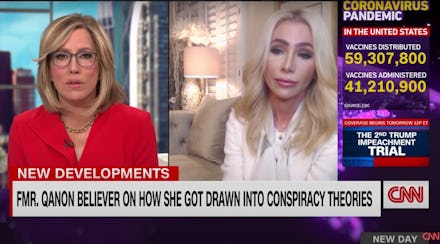Let's get the basics out of the way right off the bat. QAnon is a sprawling, mutating, endlessly adaptable cloud of conspiracy theories, which at its core posits the existence of a murderous cabal of high-ranking politicians, celebrities, and other notables, who are engaged in satanic worship, pedophilia, and child sacrifice. To be clear: It is total, unadulterated, pathetically recycled bullshit. But, thanks in no small part to its ability to effortlessly cannibalize any other conspiracy theories in its path, QAnon has become one of the more seductive — and as a result, incredibly widespread — fictions of our time.
Which poses the question: What are you supposed to do when a not-insignificant portion of the population is inclined to believe things like, say, "Hillary Clinton murdered a child on video, and then wore its face as a mask," as one particularly deranged QAnon narrative suggests?
According to former QAnon adherent Melissa Rein Lively, the descent into the unhinged depths of algorithm-delivered conspiracy-mongering can be so rapid and subtle that the only way out is through self-extraction.
Speaking Monday with CNN New Day's Alisyn Camerota, Lively discussed her introduction to QAnon, starting with pandemic-induced dissatisfaction that led to Facebook-scrolling which ultimately deposited her into the belly of the QAnon beast in just a matter of weeks.
"I really became all-consumed in the QAnon conspiracy theories because of a mix of fear, anxiety, depression, uncertainty, inconsistency with the information coming out about the pandemic," Lively explained. "I felt terrified. I was losing my business. I was watching people around me lose their business. I felt hopeless, I didn't know what to do, so I went to the internet."
But while the path into a worldview that is able to endlessly adjust itself to whatever anxieties and inconsistencies you might need answered at any given time can be a quick and easy one, the path out is decidedly trickier.
"I had to make a very serious decision for my health and my family, and that was voluntarily seeking mental health treatment," Lively told Camerota, before raising the catch-22 inherent in countering QAnon's infectious spread. Here's her advice for escaping the QAnon mind hole:
I know that these people have to be empowered to make the conscious choice to leave the cult themself. The more that people, y'know, berate them, call them names, call them stupid, y'know, laugh at them, mock them, they are just gonna dig their heels in harder and become more isolated, more scared, and more alone. So my advice is to love these people, understand these people. Try to come to even ground and reason with them as best you can. Find things — common ground — things that you can agree on, and start there. And really try to isolate what their fears are, and what's motivating the irrational behavior and obsession with QAnon.
But finding "common ground" with people who believe in a cabal of politician-satanists who eat children is easier said than done. That Lively had a stable family structure able to give her the support she needed to volunteer for mental health counseling is not necessarily a replicable situation. What's more, heartening as it sounds, working to establish a baseline reality — something that just so happens to be quickly slipping away en masse — without criticizing an invented worldview that revels in its distortion and outright rejection of facts is, frankly, not a hugely appealing project.
This, then, is one of the prime tragedies of QAnon: Its appeal comes from a sense of affirmation and inclusivity for those who feel dissatisfied with the world around them. And to counteract that appeal, people are being asked find commonality with the fictions being offered by the conspiracy theory, while at the same time encouraging their loved ones to return to the world of dissatisfaction outside the easy answers — and the accompanying sense of community — QAnon provides.
In just a few years, QAnon has become one of the most destructive social movements in the country today. And from the looks of it, it's likely to be with us, one way or another, for a long time to come.
